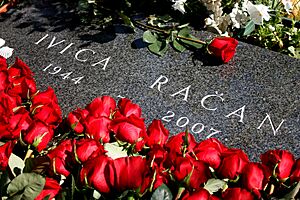Ivica Račan facts for kids
Quick facts for kids
Ivica Račan
|
|||||||||||||||||||||||||||||||||||||||||
|---|---|---|---|---|---|---|---|---|---|---|---|---|---|---|---|---|---|---|---|---|---|---|---|---|---|---|---|---|---|---|---|---|---|---|---|---|---|---|---|---|---|
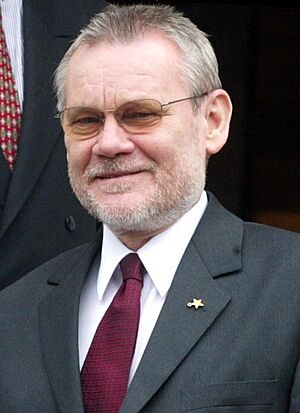
Račan in 2003
|
|||||||||||||||||||||||||||||||||||||||||
| Prime Minister of Croatia | |||||||||||||||||||||||||||||||||||||||||
| In office 27 January 2000 – 23 December 2003 |
|||||||||||||||||||||||||||||||||||||||||
| President | Vlatko Pavletić (Acting) Zlatko Tomčić (Acting) Stjepan Mesić |
||||||||||||||||||||||||||||||||||||||||
| Preceded by | Zlatko Mateša | ||||||||||||||||||||||||||||||||||||||||
| Succeeded by | Ivo Sanader | ||||||||||||||||||||||||||||||||||||||||
| President of the League of Communists of Croatia | |||||||||||||||||||||||||||||||||||||||||
| In office 13 December 1989 – 3 November 1990 |
|||||||||||||||||||||||||||||||||||||||||
| Preceded by | Stanko Stojčević | ||||||||||||||||||||||||||||||||||||||||
| Succeeded by | Office abolished | ||||||||||||||||||||||||||||||||||||||||
|
|||||||||||||||||||||||||||||||||||||||||
| Personal details | |||||||||||||||||||||||||||||||||||||||||
| Born | 24 February 1944 Ebersbach, Nazi Germany (now Germany) |
||||||||||||||||||||||||||||||||||||||||
| Died | 29 April 2007 (aged 63) Zagreb, Croatia |
||||||||||||||||||||||||||||||||||||||||
| Political party | SKH (1961–1990) SDP (1990–2007) |
||||||||||||||||||||||||||||||||||||||||
| Spouses |
|
||||||||||||||||||||||||||||||||||||||||
| Children | 2 | ||||||||||||||||||||||||||||||||||||||||
| Alma mater | University of Zagreb | ||||||||||||||||||||||||||||||||||||||||
Ivica Račan (born 24 February 1944 – died 29 April 2007) was an important Croatian politician. He served as the Prime Minister of Croatia from 2000 to 2003. During this time, he led two governments made up of several political parties working together.
Račan was the first prime minister of Croatia who was not from the Croatian Democratic Union (HDZ) party. His party, the Social Democratic Party (SDP), won the election in 2000. This was the first time his party came to power since Croatia became independent. He was the leader of the SDP from 1990 until 2007.
Before becoming prime minister, Račan was the Leader of the Opposition twice. This means he led the main party that was not in power. His first time was from May 1990 to July 1991. His second time was from 2003 until his death in 2007.
Contents
Early Life and Education
Ivica Račan was born on 24 February 1944 in Ebersbach, which was then in Nazi Germany. His mother was in a labor camp there during World War II. He and his mother survived a big bombing of Dresden. They were trapped for days in a collapsed building's basement.
After the war, Račan moved back to Croatia. He spent his childhood in Slavonski Brod. Later, he moved to Zagreb and studied at the University of Zagreb. In 1970, he finished his law degree at the Zagreb Faculty of Law.
Political Journey
Starting in Politics (1961–1989)
Račan began his political career in 1961. He joined the League of Communists of Croatia (SKH). This was the Croatian part of the larger League of Communists of Yugoslavia. He led the communist youth group in his high school.
From 1963 to 1974, he worked at a research institute. He studied how workers could manage their own businesses. In 1972, he became a full-time politician. He joined the main committee of the Croatian communists. He was also in charge of ideas and culture for the party.
From 1982 to 1986, he directed a political school. In 1986, he was chosen to represent Croatia in the Yugoslav communist leadership in Belgrade. In the late 1980s, Račan became president of the SKH. He stood up for the rights of different parts of Yugoslavia.
In January 1990, Račan led the Croatian group at a big party meeting. This meeting was about the future of Yugoslavia. The Croatian and Slovenian groups wanted more freedom for their regions. Their ideas were rejected. So, the Slovenian group left the meeting. Račan then said that a communist party without the Slovenes was not right. He also left, and the meeting ended.
Years in Opposition (1990–1999)
Under Račan's leadership, the SKH changed its name. It became the Party of Democratic Reform (SDP) in February 1990. In the 1990 election, his party won 26% of the votes. They came in second place. The Croatian Democratic Union (HDZ) won the election.
Even though his party lost, they were the second-largest party. This made Račan the first Leader of the Opposition in modern Croatia. Many members of his party left to join the HDZ. The breakup of Yugoslavia and the war in 1991 made people more focused on national issues.
Račan focused on keeping his party strong during these tough times. He even accepted some of the new government's policies. Later, Dražen Budiša became the Leader of the Opposition. In the 1992 election, Račan's party barely got enough votes to stay in parliament. But they became the strongest party for social democracy.
In 1994, the SDP joined with a smaller party. They became one of the two main alternatives to the HDZ. After the war ended in 1995, people cared more about social issues. The SDP grew stronger. In the 1995 election, they finished second. This made them the main opposition party.
Prime Minister of Croatia (2000–2003)
In August 1998, Račan and Dražen Budiša signed an agreement. Their parties worked together and won the 2000 elections. This meant the HDZ was no longer in power after ten years.
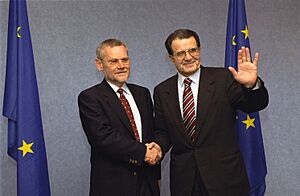
After the election, Račan became the Prime Minister of Croatia. He formed a government with six different parties. These included the SDP, HSLS, and other parties. People saw Račan as a new leader who would bring reforms. He was seen as someone who would move Croatia away from its past.
However, leading a government with six parties was hard. Račan's way of leading was sometimes called "Decisively maybe." This meant he often had to make compromises. This led to disagreements within his government.
One problem was when his main partner, Budiša, lost the presidential election. Budiša became frustrated and caused issues. This led to a split with Budiša. He took a more nationalistic view on how to handle requests from the ICTY (International Criminal Tribunal for the former Yugoslavia). This disagreement affected other government decisions. One party left the government in June 2001.
Račan resigned on 5 July 2002. This happened after his coalition partner blocked an important agreement with Slovenia. This caused a split in that party. Some members left to form a new party that stayed in the government. This allowed Račan to form a slightly changed government. It stayed in power until the next elections in 2003.
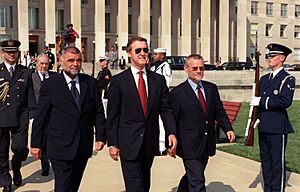
Račan's government had great success in foreign policy. He helped Croatia become more connected to other countries. He also put Croatia on the path to joining the European Union. During his time as prime minister, the Constitution of Croatia was changed. This gave more power to the parliament and the prime minister.
Račan also made the government more open. He held "open-doors days" and regular press conferences. This was very different from past governments. He also visited Bleiburg, Austria, in 2002. He attended a yearly event there.
Croatia's economy also improved under Račan. More money came into the country. This helped Croatia's economy grow by about 5% each year. The government also started big building projects. These included affordable housing and a major highway connecting Zagreb and Split. This highway was important for tourism. Račan also worked to improve relations between Croatia and its neighbors.
He faced criticism regarding the ICTY investigations. Some people on the right side of politics said he was not patriotic. Others on the left said he did not do enough to fight extremism. In February 2001, there was a big public protest. This was when the ICTY asked for a general named Mirko Norac. About 100,000 people protested in Split. Račan made a deal to have Norac tried in Croatia.
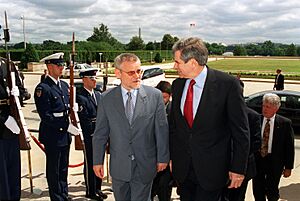
In July 2001, the ICTY asked for Ante Gotovina. Račan delayed accepting this request. He felt some parts of it were wrong about the Croatian War of Independence. Gotovina was not arrested then and went into hiding. This made it harder for Croatia to join the EU. Another ICTY request came in September 2002 for Janko Bobetko. Bobetko was very ill and refused to leave his home. Račan worried that if Bobetko died during transport, it would cause big problems. Račan rejected the request at first. He persuaded Bobetko to go to the hospital. The situation was tense until Bobetko died in April 2003. After his death, the request was dropped.
Račan was also criticized for an agreement with Slovenia in 2001. This agreement was about the Gulf of Piran. Račan wanted to improve relations with Slovenia for EU talks. The agreement would have given Slovenia most of the gulf. But it was heavily criticized by the public. The agreement was later rejected and never signed.
Back in Opposition (2003–2006)
Račan's party lost the election in November 2003. The SDP did not form a big coalition like before. This cost them votes. Račan accepted the defeat soon after the results. He officially stopped being prime minister on 23 December 2003. Ivo Sanader from the HDZ took over.
The SDP remained the most popular opposition party. Ivica Račan was seen as the leader of the Croatian opposition. While he was sometimes seen as unsure as prime minister, he was very good at leading his party for over fifteen years. In 2006, Račan said he would not run for party president again.
Illness and Passing
On 31 January 2007, Račan announced he would take a break from public life. This was due to health reasons. The vice-president of his party took over as leader. His health got worse, and he was diagnosed with cancer. In February, he had two surgeries to remove cancer. On 4 April, doctors found the cancer had spread to his brain. On 11 April, he stepped down as leader of the SDP.
He wrote a message saying: "Colleagues, friends, comrades! I am fighting a difficult illness, but it is time to thank you for our work and your support. We built a Social Democratic party together, and I am proud of what we achieved. I am proud of the social democratic values – honesty, hard work, tolerance – that we brought to our country's politics. I did my best. With this, I resign from the party presidency. You will continue without me. Find new strength for the election, I am sure it exists in SDP."
On 12 April 2007, his condition was very serious. He had complications after surgeries. A radio station wrongly reported his death, but party officials denied it. He was in critical condition and could not communicate.
On 29 April 2007, Ivica Račan passed away at 3:05 am. The cause was kidney cancer that had spread. He was buried on 2 May at the Mirogoj Cemetery. Only his closest family and twelve friends were there, as he wished. A separate event was held by the SDP. The president, prime minister, and many other important people attended.
During his three-month illness, the media often reported on his health. This was because of great public interest. Račan did not appear in public after he announced his illness. But the media was kept informed by his party. This was different from how details of President Tuđman's illness were kept secret.
When Račan resigned as party leader, he did not say who he wanted to be his successor. He asked for an election to be held. This was important because of the upcoming November 2007 election.
Personal Life
Ivica Račan was married three times. He had two sons, Ivan and Zoran, from his first marriage. His first wife, Agata Špišić, was a judge. His second wife, Jelena Nenadić, was a librarian. His third wife, Dijana Pleština, was a political science professor. Račan said he was an agnostic.
|
 | William M. Jackson |
 | Juan E. Gilbert |
 | Neil deGrasse Tyson |


